

Is Theresa May up to the job of prime minister? Here’s how to tell. What are the qualifications for political leadership?
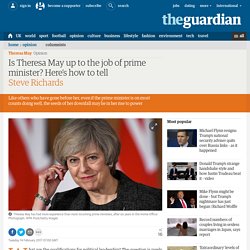
The question is rarely asked in the UK, let alone answered. Theresa May became prime minister after taking part in the shortest leadership contest in modern times. She made one speech before moving into No 10. There was no time to reflect on her qualifications for the momentous tasks of leadership. Even if the campaign had lasted a lifetime, there would have been little reflection. While anyone seeking to be a chief executive in the public or private sector would expect to be asked intensively about their qualifications, there are no clear criteria about what requirements are essential for an aspirant prime minister. In recording a series of unscripted, straight-to-camera talks on modern prime ministers for the BBC, I began to see clear patterns relating to the qualifications for political leadership.
The first is previous ministerial experience, which is hugely important. A second qualification is often overlooked. May cuts Whitehall spads but keeps her own as she consolidates power in No 10. When she came to power, Theresa May announced she would cap the salaries of special advisers (spads) – leading to warnings that it would be difficult to recruit good candidates.

Their numbers have fallen from 95 to 83 since the Cameron era, but almost all have gone from departments rather than No 10. Ben Yong and Harmish Mehta argue that while spads are not overly concerned about their pay, May’s priority is consolidating power in the fractious Brexit era rather than technocratic measures of effectiveness. Behind the scenes… Theresa May, followed by her husband and one of her chiefs of staff, Nick Timothy, is clapped by staff as she enters No 10 for the first time as PM. Photo: No 10 via a CC-BY-NC-ND 2.0 licence Just before Christmas, the government made its annual data release, setting out the number of spads and how they are distributed across government. The bigger question is what all this says about May’s government, and more generally, British government. Maybe. The crew are cutting each other’s throats on Mrs May’s leaking ship.
It is the classic Spitting Image sketch of Margaret Thatcher in her pomp.
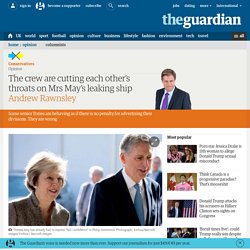
The satirists created a scene in which the rubber puppet of the prime minster sat at a restaurant table surrounded by her cabinet. She orders raw steak. The waitress then asks: “And what about the vegetables?” Motioning to her cringing ministers, Mrs T replies: “They’ll have the same as me.” That was a caricature. In her early days at Number 10, there was an ambition to achieve a grip over government more steely than that achieved by Mrs T even at the zenith of her power. There are almost daily reveals of confidential papers prepared for internal discussions between ministers, especially of anything touching on Brexit. At the most recent prime minister’s questions, Mr Clarke was moved to condemn the “Brexiter ministers” whom he identified as the principal culprits. Cameron attempts to heal Tory rifts over IDS resignation. Image copyright Getty Images Prime Minister David Cameron will later attempt to halt the civil war in his party caused by Iain Duncan Smith's resignation from the cabinet.
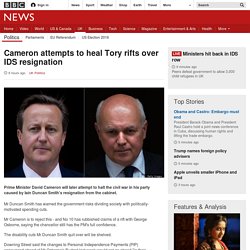
Mr Duncan Smith has warned the government risks dividing society with politically-motivated spending cuts. Mr Cameron is to reject this - and No 10 has rubbished claims of a rift with George Osborne, saying the chancellor still has the PM's full confidence. The disability cuts Mr Duncan Smith quit over will be shelved. Downing Street said the changes to Personal Independence Payments (PIP) announced ahead of Mr Osborne's Budget last week would not go ahead "in their current form". Sunday Trading defeat for Cameron. The Conservative government has hoped to pass a bill that would allow councils in England and Wales to determine the opening hours of large shops in their area; however a rebellion of 27 Tory MPs coupled with the SNP vote meant they lost that vote 317-286.

This is great evidence for all manner of AS level topics. Firstly, the perils of a small majority. Whilst the article at the top of the list above looks at all the reasons that such rebellions have been limited (good whips, weak and fragmented opposition, etc) this defeat clearly highlights a problem that PM’s with large majorities have not faced. EU debate raises questions over power at the top of government. One of the odder things about the wrangle over Britain’s EU membership is that very few people seem at all worried about who exactly is a member of the cabinet.
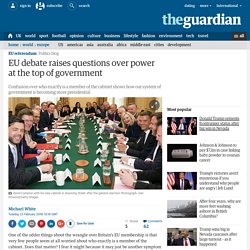
Does that matter? I fear it might because it may just be another symptom of the decay of cabinet government in favour of a more presidential system, one adjusted to the needs of TV like major sports now are. Are there six cabinet ministers supporting the Brexit campaign, as is routinely asserted? No, there are five: Priti Patel is usually included alongside IDS, Gove, Whittingdale, Grayling and Villiers because she ticks a couple of obvious boxes and attends cabinet, one of seven ministers of state thus favoured. ‘In modern times the prime minister, not the Cabinet, dominates the executive’
Government “wages war” on Parliament. This outstanding article from the Independent is an absolute must read for the UK Constitution, PM & Cabinet and Parliament topics of Unit 2 and for Democracy and Parties (and to a lesser extent elections) in Unit 1.
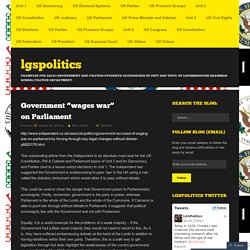
Cameron’s Plane! David Cameron is to get his own plane for official trips.

It’s not perhaps as fancy as Air Force One and perhaps can be rationalised; for students of Politics however it is a prime example of the PM acting more like a president than like a PM which is part of a cabinet. KEY – When comparing PM and ‘presidency’, be wary of comparing simply to Obama or to the US model of ‘the president’. The presidency is a theory – the elected president has an individual mandate, is elected separately, is the Head of State, and is the single accountable member of the executive.
The PM, by comparison, is elected in a constituency as any normal MP, is part of a collective executive (PM & Cabinet) and is therefore collectively responsible, and does not have an individual mandate. Famous UK Cabinet Reshuffles. EU Referendum: Six Tory Cabinet ministers demand freedom to campaign for Brexit. "If everyone was told to support the 'In' campaign, they would have to resign.
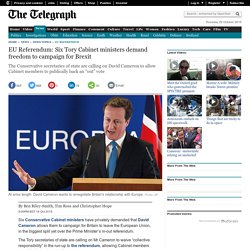
That would certainly not be ideal" Cabinet minister Mr Cameron has pledged to renegotiate Britain’s relationship with Brussels before holding a referendum before the end of 2017. He has said that if his renegotiation is successful, he will campaign for Britain to remain in Europe. Downing Street insists that no decision has yet been taken on whether collective responsibility will apply ahead of the referendum.